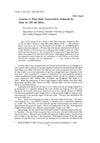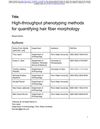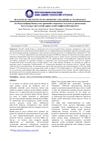 7 citations,
July 2018 in “Biological & Pharmaceutical Bulletin”
7 citations,
July 2018 in “Biological & Pharmaceutical Bulletin” Phyllanthus urinaria extract may help treat hair loss by blocking a hair-related enzyme.
 5 citations,
July 2017 in “Women & Health”
5 citations,
July 2017 in “Women & Health” Nursing women in the West Bank with higher income and non-smoking habits have higher blood zinc levels.
 4 citations,
March 2022 in “Frontiers in pharmacology”
4 citations,
March 2022 in “Frontiers in pharmacology” Prunus mira Koehne is valuable for hair growth and has potential for sustainable use, but needs more research and conservation.
 4 citations,
January 1992 in “The Tohoku Journal of Experimental Medicine”
4 citations,
January 1992 in “The Tohoku Journal of Experimental Medicine” Zinc made mice's coarse hair turn into fine hair without affecting skin structure.
 3 citations,
November 2022 in “Frontiers in oncology”
3 citations,
November 2022 in “Frontiers in oncology” Low zinc levels may be linked to the return of gynecologic cancers.
 3 citations,
July 2017 in “International journal of medicine”
3 citations,
July 2017 in “International journal of medicine” Intralesional triamcinolone acetonide effectively treats alopecia areata, as shown by significant improvements in hair regrowth and dermoscopic indicators.
 3 citations,
January 2015 in “Nasza Dermatologia Online”
3 citations,
January 2015 in “Nasza Dermatologia Online” Some treatments for autoimmune hair loss work, but JAK inhibitors like tofacitinib are promising for regrowth.
 3 citations,
March 2014 in “Journal of Industrial Microbiology & Biotechnology”
3 citations,
March 2014 in “Journal of Industrial Microbiology & Biotechnology” Scientists found a new gene in a bacterium that can modify an immunosuppressant drug, potentially helping to treat hair loss.
 2 citations,
September 2019 in “South Asian research journal of pharmaceutical sciences”
2 citations,
September 2019 in “South Asian research journal of pharmaceutical sciences” Heavy metals in personal care products can cause serious health issues like cancer and hair loss.
 2 citations,
December 2018 in “Journal of cosmetic dermatology”
2 citations,
December 2018 in “Journal of cosmetic dermatology” Higher CRBP1 levels are linked to more severe alopecia areata.
 2 citations,
February 2014 in “Hair therapy & transplantation”
2 citations,
February 2014 in “Hair therapy & transplantation” Alopecia Areata is an autoimmune condition causing hair loss, influenced by genetics, environment, and possibly improved by anti-MIF therapy, with many patients experiencing regrowth within a year.
 1 citations,
February 2022 in “Open Access Macedonian Journal of Medical Sciences”
1 citations,
February 2022 in “Open Access Macedonian Journal of Medical Sciences” Low zinc levels might contribute to early hair graying.

Adequate vitamin D might lower, and high hair chromium might increase DNA damage in obese women.
 1 citations,
June 2021 in “International Journal of Dermatology”
1 citations,
June 2021 in “International Journal of Dermatology” People with alopecia areata had lower vitamin D levels, but these levels didn't relate to many aspects of the condition.
 1 citations,
November 2020 in “bioRxiv (Cold Spring Harbor Laboratory)”
1 citations,
November 2020 in “bioRxiv (Cold Spring Harbor Laboratory)” Quantifying hair shape is better than using racial categories for understanding hair characteristics.
 1 citations,
December 2018 in “IntechOpen eBooks”
1 citations,
December 2018 in “IntechOpen eBooks” Human hair shows promise for non-invasive medical testing, but more research is needed to standardize its use.
 1 citations,
July 2018 in “Journal of Pakistan Association of Dermatology”
1 citations,
July 2018 in “Journal of Pakistan Association of Dermatology” Microneedling with PRP is a safe and effective way to treat chronic alopecia areata, improving hair regrowth with minimal side effects.
 1 citations,
January 2013 in “Springer eBooks”
1 citations,
January 2013 in “Springer eBooks” Cosmeceuticals may benefit skin health but need more research for efficacy and safety confirmation.
 May 2024 in “Portuguese journal of dermatology and venereology”
May 2024 in “Portuguese journal of dermatology and venereology” Reassurance and counseling are key in managing acute telogen effluvium, with supplements possibly offering a placebo effect.

Hair analysis can help identify specific minerals and amino acids linked to various diseases.
 April 2024 in “Research Square (Research Square)”
April 2024 in “Research Square (Research Square)” Selenium supplements can help improve symptoms and metabolic markers in lupus patients.
 March 2024 in “Clinical, cosmetic and investigational dermatology”
March 2024 in “Clinical, cosmetic and investigational dermatology” Tofacitinib successfully treated vitiligo in a patient with lupus without side effects.
 February 2024 in “Research Square (Research Square)”
February 2024 in “Research Square (Research Square)” People today have lower levels of arsenic, lead, cadmium, and iron in their hair than people did 100 years ago.
 January 2024 in “Research Square (Research Square)”
January 2024 in “Research Square (Research Square)” A specially designed molybdenum oxide nanozyme can treat and monitor acute kidney injury effectively.
 February 2023 in “Journal of clinical medicine research”
February 2023 in “Journal of clinical medicine research” Zinc acetate hydrate may help reduce fatigue and hair loss in post-COVID-19 patients.
 January 2023 in “Research Square (Research Square)”
January 2023 in “Research Square (Research Square)” Hair glycation could be a reliable non-invasive indicator of blood glucose control, but its use is limited by factors like sample collection and hair treatments.
 January 2023 in “Journal of pharmacognosy and phytochemistry”
January 2023 in “Journal of pharmacognosy and phytochemistry” Herbal home remedies can effectively treat hair loss with fewer side effects.
 December 2022 in “Himi, himijn tehnologijn hùrèèlèngijn èrdèm šinžilgèènij bùtèèl”
December 2022 in “Himi, himijn tehnologijn hùrèèlèngijn èrdèm šinžilgèènij bùtèèl” Hair products with copper and zinc enriched yeast made hair thicker and denser.
 October 2021 in “The Egyptian Journal of Hospital Medicine”
October 2021 in “The Egyptian Journal of Hospital Medicine” Alopecia areata causes patchy hair loss and involves immune system disruptions.
 June 2020 in “International journal of research in dermatology”
June 2020 in “International journal of research in dermatology” Taking choline-stabilized orthosilicic acid orally significantly improved hair, skin, and nail health without side effects.






























